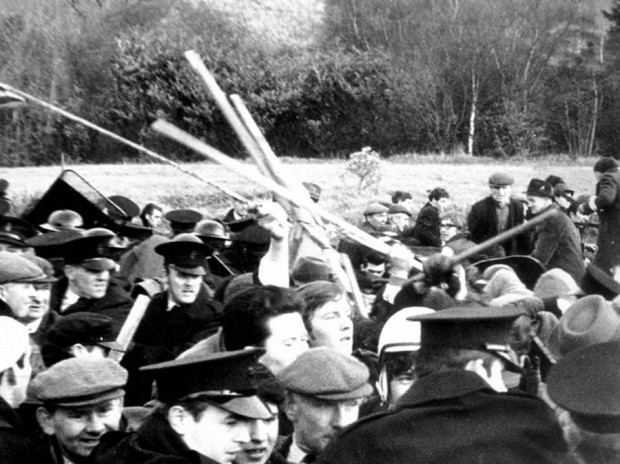
by David Levinson
A different civil rights struggle
When Ireland gained independence in 1922, six predominantly Protestant counties in the north of the island opted to remain part of the United Kingdom, forming what is today known as Northern Ireland. In the almost 50 years since the partition, there have been tensions both between the two parts and within Northern Ireland between those who want a unified Ireland—predominantly Irish Catholics—and those who prefer the status quo: predominantly Protestants whose ancestors emigrated from Scotland. There have been riots and armed attacks over the decades, but the last few years have been relatively peaceful.
Irish Catholics in the north face discrimination in housing and employment, their political power is diluted by carefully drawn electoral districts, and they are grossly underrepresented in the police, which are backed by Protestant paramilitary units. In the last few years, a civil rights campaign has developed in an effort to right these wrongs. The first of several civil rights marches took place last August. In October, a march took place in Londonderry (called by its older name of Derry by the Irish) despite being denied permission. Television cameras caught images of police attacking the peaceful marchers, sparking outrage around the world.
Spurred by those images, a group of students at Queen’s University in Belfast formed People’s Democracy. On New Year’s Day, they began a march from Belfast to Derry, in imitation of Dr. King’s Selma to Montgomery marches. Along the way, they were met by counter-protests and occasionally attacked. On the 4th, as they approached a bridge in the village of Burntollet a few miles outside Derry, they were attacked by 200-300 Ulster Loyalists (a group not unlike the Citizens’ Councils in the American South) wielding stones, iron bars, and sticks spiked with nails. Meanwhile, the police stood by and did nothing.
 Counter-protesters armed with sticks and iron bars attack civil rights marchers while the police look on
Counter-protesters armed with sticks and iron bars attack civil rights marchers while the police look on
That evening, the police stormed into the Bogside neighborhood, attacking Catholics in and outside their homes. Residents forced the police out and set up barricades. Police were denied any access to “Free Derry,” as it came to be known, for nearly a week. Eventually, the barricades came down and police patrols resumed, but tensions remain high.
At this point, a political solution seems unlikely, certainly not one from the Parliament of Northern Ireland. Proposals thus far have been not enough for the nationalists and too much for the loyalists.
A winning issue
At the 1966 Worldcon, IF won the Hugo for Best Professional Magazine. To celebrate, editor Fred Pohl trumpeted a Hugo winner’s issue. He didn’t quite succeed; Frank Herbert wasn’t able to contribute due to a health issue, and the whole thing was weighed down by an installment of a not very good Algis Budrys serial. IF won again the next year, but there was no comparable issue. Last year, the magazine took its third straight best prozine Hugo, and Fred decided to try again. This time, he got every winner to contribute, and I do mean every. Even the winners in the fan categories are here. Let’s see how it all stacks up.
 The Steel General rides again. Art by Best Professional Artist Jack Gaughan
The Steel General rides again. Art by Best Professional Artist Jack Gaughan
Continue reading [February 2, 1969] Winners and Losers (March 1969 IF)

![[February 2, 1969] Winners and Losers (March 1969 <i>IF</i>)](https://galacticjourney.org/wp-content/uploads/2024/01/IF-1969-03-Cover-574x372.jpg)